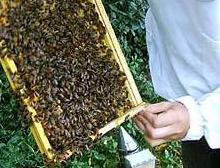
· Young Beekeepers ·

Anita Khushwaha, a young woman who follows her heart and breaks barriers (Bochaha village, Bihar, India)
In Bihar State, where Anita lives, only 1 in 6 girls is literate. When she was younger, after much persuasion, her parents agreed to put her through 5th grade.
After that, it was up to her to find the funds to attend classes. "I saw that the bees were so tiny, but they did so much work! They collect so much honey. So, I thought, if these little insects can achieve so much, I am such a huge person, I have hands and legs, why can't I achieve anything? I decided to nurture the bees and become like them, and remain busy like them."
Anita was the first young woman in her community to try beekeeping - traditionally a man's job. Today, she has over 125 boxes of bees, pays for college by selling their honey and is still only 18 years old. | UNICEF: more,


Mackenzie Pierson: Bees are the joy and the nectar in our life (Shelburne, Vermont, U.S.A.)
"The bees teach me, everyday, that the nectar in life is achieved through intense focus, commitment, dedication to sustainable and nurturing communities, and the willingness to take risks. I had never really thought about beekeeping until my sophomore year of high school when my history teacher, Bill Mares brought a live queen bee to class in a small wooden box. I watched its small body through the mesh covering and wondered what its life must be like. So, what drew me to beekeeping? I had not even seen a hive yet. I guess it was the sweet-tasting golden joy that coated my oatmeal and toast. I had loved honey, and now I loved it even more because of my respect for the bees. I just looked down at my toast and thought of all the mystery that surrounded the hive. I wanted to be in the "in" group, to know where this sweet tasting delight came from. However, it was more than that. In an ever changing world the bees are what hold us together. They are the most supportive structure in our lives, and they fly by unseen. Honeybees are responsible for approximately 80% of all fruit, vegetable and seed crops in the U.S and that is approximately every third bite of food one eats. I got my first hive on July 16th, 2006. It was a generous gift from Russ Aceto, a published and two year senior beekeeper up in Fairfax, Vermont. It was a hot and humid day and the bees hummed uncomfortably as we slid the covered nuc box into the trunk of my Subaru. I had never driven with bees in the back seat and sweat dripped off the end of my nose... When we are in risky situations we often use force, but that does not work with the bees. Working with the bees has taught me that what the world really needs is compassion, respect and awareness. I am willing to risk exploring the unknown so I can be a part of the solution and not react to the world from a place of fear. As I pull the white suit over my head, I realize I cannot pretend that social, environmental or economical problems do not exist, but I can arm myself with knowledge, dreams and hope. I can add my teaspoon of honey to the future..." | Mackenzie's photo with her bees, and her story - from the Honey Gardens. She graduated from high school in 2007.
© Yarmosh AG 2007